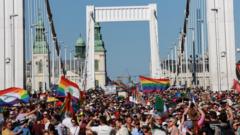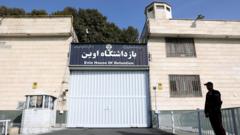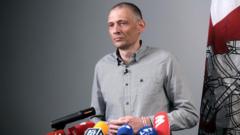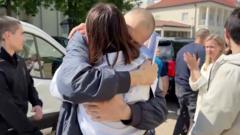Cardinal Pablo Virgilio David reflects on his unexpected appointment as a cardinal and the challenges faced by the Philippines Church as he prepares to vote at the conclave.
Pope Francis Supports Filipino Cardinal as He Votes in the Papal Conclave

Pope Francis Supports Filipino Cardinal as He Votes in the Papal Conclave
Cardinal David's Journey from Poverty Advocacy to Papal Candidate in Manila
Cardinal Pablo Virgilio David, recently appointed by Pope Francis, is preparing to vote in the papal conclave while reflecting on his humble beginnings as a bishop serving the urban poor in the Philippines. "Not even in my wildest imagination did I think this would happen," Cardinal David said in an interview at his cathedral in Caloocan, just outside Manila. As one of only three Filipino cardinals participating, he aims to embody the late Pope's mission of reconnecting the Catholic church with its congregants.
Since his appointment last December, Cardinal David has emerged as a symbol of the pontiff's legacy in a country where nearly 80% of the population identifies as Roman Catholic. His focus on serving marginalized communities sharply contrasts with the norm of archbishops attaining cardinal status, indicating a shift towards inclusivity. The rich historical ties between the church and Filipino society complicate the landscape, with the local Catholic church grappling with modern challenges, including political pressures and the rise of charismatic congregations.
The influence of the church in the nation, particularly under former President Rodrigo Duterte's controversial drug war, marked a turning point for Cardinal David. He criticized the campaign, which led to thousands of deaths, and became an advocate for those targeted by police actions. Following his vocal opposition, he received threats, but the support from Pope Francis during tough times provided him some solace. At their meetings, the Pope offered blessings and encouragement, highlighting the importance of safety and moral leadership.
As the conclave approaches, the future of the Catholic Church in the Philippines hangs in the balance, with potential candidates like Filipino Cardinal Luis Antonio Tagle seen as frontrunners. Amid societal shifts and political transformations, the church faces a diminishing influence, struggling to maintain its relevance in an evolving landscape filled with competing ideologies. The recent decline in mass attendance and scandals surrounding the clergy emphasize the church's need for humility and openness to foster connections with the communities they serve.
Cardinal David believes in cautious engagement with political matters, reiterating that the church's role is to guide but not govern. With ongoing discussions about divorce and reproductive rights, he acknowledges the tension between church doctrine and societal needs. As he prepares for this critical moment in church history, the cardinal maintains a hopeful outlook for a more inclusive and responsive future for the Catholic Church in the Philippines.
Since his appointment last December, Cardinal David has emerged as a symbol of the pontiff's legacy in a country where nearly 80% of the population identifies as Roman Catholic. His focus on serving marginalized communities sharply contrasts with the norm of archbishops attaining cardinal status, indicating a shift towards inclusivity. The rich historical ties between the church and Filipino society complicate the landscape, with the local Catholic church grappling with modern challenges, including political pressures and the rise of charismatic congregations.
The influence of the church in the nation, particularly under former President Rodrigo Duterte's controversial drug war, marked a turning point for Cardinal David. He criticized the campaign, which led to thousands of deaths, and became an advocate for those targeted by police actions. Following his vocal opposition, he received threats, but the support from Pope Francis during tough times provided him some solace. At their meetings, the Pope offered blessings and encouragement, highlighting the importance of safety and moral leadership.
As the conclave approaches, the future of the Catholic Church in the Philippines hangs in the balance, with potential candidates like Filipino Cardinal Luis Antonio Tagle seen as frontrunners. Amid societal shifts and political transformations, the church faces a diminishing influence, struggling to maintain its relevance in an evolving landscape filled with competing ideologies. The recent decline in mass attendance and scandals surrounding the clergy emphasize the church's need for humility and openness to foster connections with the communities they serve.
Cardinal David believes in cautious engagement with political matters, reiterating that the church's role is to guide but not govern. With ongoing discussions about divorce and reproductive rights, he acknowledges the tension between church doctrine and societal needs. As he prepares for this critical moment in church history, the cardinal maintains a hopeful outlook for a more inclusive and responsive future for the Catholic Church in the Philippines.



















